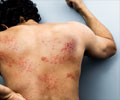- Herpes Zoster - (https://www.ncbi.nlm.nih.gov/books/NBK441824/)
- Whence 'zoster'? The convoluted classical origins of a sometimes illogical term - (https://pubmed.ncbi.nlm.nih.gov/27521291/)
- Herpes Zoster (Shingles) and Postherpetic Neuralgia - (https://www.ncbi.nlm.nih.gov/pmc/articles/PMC2664599/)
General info about Shingles
Shingles' or 'Herpes Zoster' are painful skin rashes that appear usually on the side of the chest wall as a band. It is caused by reactivation of the dormant chicken pox virus- varicella zoster(1✔ ✔Trusted Source
Herpes Zoster
Go to source).
The word 'shingles' comes from the Latin word 'cingulum' meaning 'girdle'. This is due to a classical band of blisters encircling the side of the torso resembling a 'girdle'(2✔ ✔Trusted Source
Whence 'zoster'? The convoluted classical origins of a sometimes illogical term
Go to source). Shingles can also affect other parts of the body such as the neck, face and scalp. The term 'herpes' comes from the Greek word meaning, 'to creep.'
Shingles is a secondary infection; a second outbreak of the 'chicken pox virus'. This means that shingles particularly affects those who have previously suffered an attack of chicken pox.
The condition is excruciatingly painful as it involves the nerves. It is difficult to diagnose in the early stage when pain is the only symptom.Once the one-sided rash and blisters appear, it is more readily identified as these rashes follow the distribution of a nerve branch.
It is not a life threatening condition, but shingles can produce such acute pain. A mere touch may cause the pain, which may last for several months even after the rashes have disappeared. The condition is then called 'post herpatic neuralgia'(3✔ ✔Trusted Source
Herpes Zoster (Shingles) and Postherpetic Neuralgia
Go to source)
Shingles is an infectious disease and hence the afflicted person may pass on the virus to any individual who has not had an attack of chicken pox. These individuals may develop full-blown chicken pox, instead of shingles.
Pregnant women and new -borns also belong to the high-risk category. The disease cannot be passed on to anyone who has already had an attack of chicken pox and in whom the immune system is in a healthy state.
It is primarily a disease of the elderly, but it can occasionally affect young individuals as well.
Early treatment with anti-viral medication reduces pain and the associated complications.









